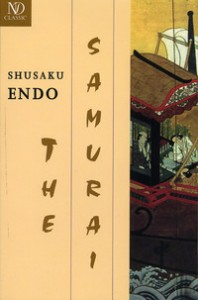Book Review: The Samurai by Shusaku Endo
 I just finished reading Shusaku Endo’s The Samurai, and it was eye-opening in so many ways. It is the story of two men: Father Velasco, the flawed but well-meaning missionary to Japan, and Hasekura Rokuemon, the quiet Samurai who only wants to do his duty. Both men have a mission, both of them are forced to compromise their integrity for the sake of that mission, and neither of them get what they want. In the end, however, The Samurai is a gentle reminder that God “writes straight with crooked lines,” and no matter how hard we try to bring the gospel to others, it is Jesus Christ alone who has the power to convert hearts. Endo, a Japanese Catholic, reminds us that “the essence of Christianity is determined not by bureaucratic fiat, but by the private yearnings of each and every believer.”
I just finished reading Shusaku Endo’s The Samurai, and it was eye-opening in so many ways. It is the story of two men: Father Velasco, the flawed but well-meaning missionary to Japan, and Hasekura Rokuemon, the quiet Samurai who only wants to do his duty. Both men have a mission, both of them are forced to compromise their integrity for the sake of that mission, and neither of them get what they want. In the end, however, The Samurai is a gentle reminder that God “writes straight with crooked lines,” and no matter how hard we try to bring the gospel to others, it is Jesus Christ alone who has the power to convert hearts. Endo, a Japanese Catholic, reminds us that “the essence of Christianity is determined not by bureaucratic fiat, but by the private yearnings of each and every believer.”
On the surface, The Samurai is historical fiction, recounting the journey of Hasekura Rokuemon and other Japanese emissaries to Mexico, Spain, and eventually Rome to see Pope Paul V in 1615. Rokuemon and his companions were the first Japanese emissaries to the Americas. It’s a fascinating story, and Endo tells it with great restraint, avoiding the temptation to over dramatize the events.
At its heart, however, The Samurai is an honest, unsentimental look at religious conversion, and the frustration of trying to bring about conversion in someone else. Father Velasco, as good as his intentions are, makes the mistake of thinking only he can bring salvation to Japan, and that only he understands God’s will. Velasco is a compelling character, because he is so much like so many of us–trying to do the right thing, thinking we know what God has planned for us, and hurt when things don’t go the way we expect them to.
Despite all of Velasco’s manipulations, Hasekura Rokuemon resists Christianity, continually asking the same question: “How can you revere such a miserable, wretched fellow? How can you worship someone so ugly and emaciated?” Yet all the time it is the “ugly emaciated man on the cross” that Rokuemon cannot get out of his head. It is not Velasco’s catechism classes, nor his rational arguments, nor his manipulative machinations. It is simply the man on the cross, the companion in our suffering. In one of the most beautiful scenes from the book, the power of Jesus is summarized in two lines:
“From now on…He will be beside you.” “From now on…He will attend you.”
Unlike Velasco, Jesus makes no promises to us in this life, except that he will always be with us, especially in our suffering.
The Samurai is beautifully written, and an essential book for all Catholics to read, especially those engaged in active evangelization. Highly recommended.































